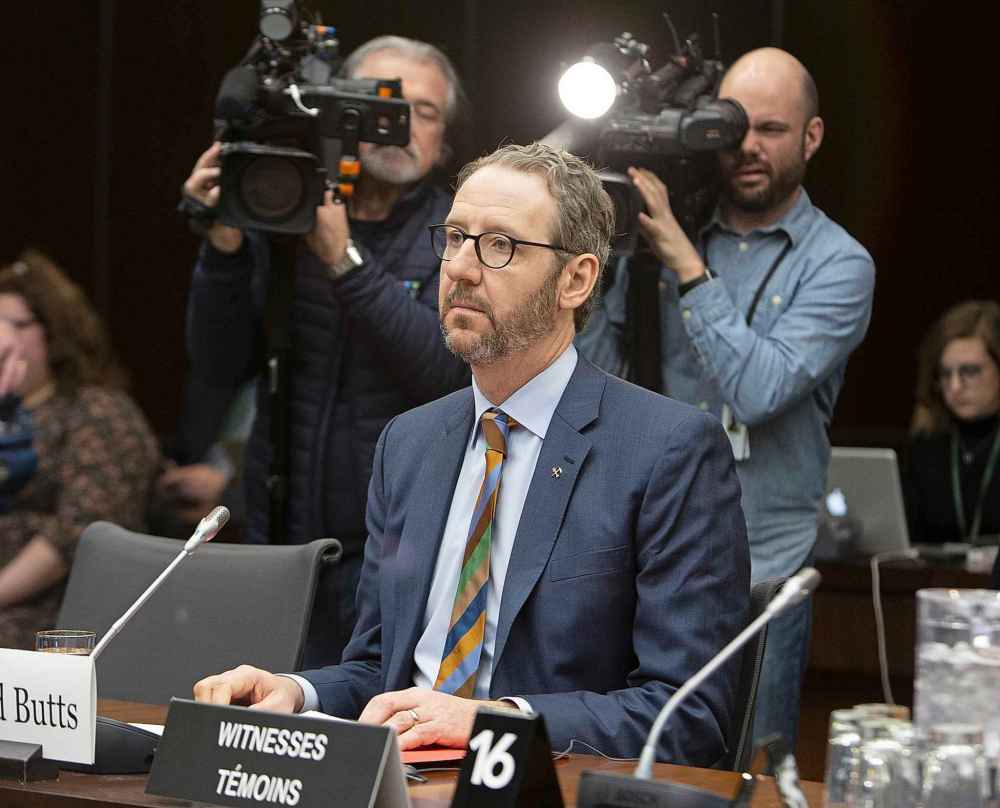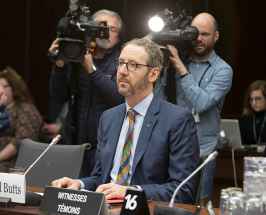Rebuttals to Wilson-Raybould deepen the drama
Read this article for free:
or
Already have an account? Log in here »
To continue reading, please subscribe:
Monthly Digital Subscription
$0 for the first 4 weeks*
- Enjoy unlimited reading on winnipegfreepress.com
- Read the E-Edition, our digital replica newspaper
- Access News Break, our award-winning app
- Play interactive puzzles
*No charge for 4 weeks then price increases to the regular rate of $19.00 plus GST every four weeks. Offer available to new and qualified returning subscribers only. Cancel any time.
Monthly Digital Subscription
$4.75/week*
- Enjoy unlimited reading on winnipegfreepress.com
- Read the E-Edition, our digital replica newspaper
- Access News Break, our award-winning app
- Play interactive puzzles
*Billed as $19 plus GST every four weeks. Cancel any time.
To continue reading, please subscribe:
Add Free Press access to your Brandon Sun subscription for only an additional
$1 for the first 4 weeks*
*Your next subscription payment will increase by $1.00 and you will be charged $16.99 plus GST for four weeks. After four weeks, your payment will increase to $23.99 plus GST every four weeks.
Read unlimited articles for free today:
or
Already have an account? Log in here »
Hey there, time traveller!
This article was published 06/03/2019 (2470 days ago), so information in it may no longer be current.
Another day of testimony, another day further from clarity.
The House of Commons justice committee again became the centre of national political attention on Wednesday with testimony from former principal secretary Gerald Butts, current Privy Council Office Clerk Michael Wernick (for a second time) and current Deputy Attorney General Nathalie Drouin. All three were called to answer questions about internal deliberations on whether engineering firm SNC-Lavalin should have been provided with a Deferred Prosecution Agreement (DPA) to avoid a potential criminal conviction on bribery charges.
All three witnesses were called to rebut the explosive testimony of former attorney general Jody Wilson-Raybould, who accused Trudeau and his senior political staff of a campaign of inappropriate influence to convince her to intervene in the SNC-Lavalin case.

While no one disputed that Wilson-Raybould felt she was the subject of inappropriate pressure to intervene in the SNC-Lavalin, those accused of applying that pressure — Butts and Wernick in particular — strenuously denied that what they said and did was fairly characterized as “inappropriate”.
From Butts, we got a story about a legal case that was of significant political and economic interest for the government of the day that had fallen under the auspices of a new and untested law. Butts did not deny that the Liberal government was interested in seeing SNC-Lavalin obtaining a DPA, but denied allegations that he ever asked Wilson-Raybould to act outside the law to help the company.
He emphasized that because it was the first application of the DPA law, he and other senior political staff believed that it was very appropriate for Wilson-Raybould to obtain a third-party legal opinion to ensure that her decision to not intervene in the case was legally sound.
None of that testimony was particularly new or consequential. However, there were a few new facts that further complicated our understanding about who did what to whom and when.
Butts said that Wilson-Raybould was assigned to the veterans’ affairs portfolio in the January cabinet shuffle not because she was being punished for refusing to help SNC-Lavalin, but because she refused a reassignment to Indigenous Services. Butts said Wilson-Raybould argued that after spending a lifetime fighting the existence of the Indian Affairs Act, she could not become the government’s chief agent for its implementation.
Traditionally, ministers do not refuse cabinet reassignments. To do so is tantamount to saying you would rather not be in cabinet. It certainly does leave open the question of whether Wilson-Raybould resigned over her concerns on SNC-Lavalin, or because she was being shuffled out of her preferred job in cabinet. Either way, Butts said the refusal strained the relationship between Trudeau and one of his key ministers.
Butts was also very direct in asserting that the “pressure” that Wilson-Raybould felt was directly connected to the government’s concern that the fate of SNC-Lavalin was a true issue of public interest. “Nine thousand people are not a political issue,” Butts said in his opening statement. “It was a very real public policy problem.”
Drouin, who was more constrained in what she could say because of her role in the justice department, confirmed much of what Wilson-Raybould said in her testimony, but also added new details that called into question some of her former boss’ assertions.
Opposition MPs have argued that the RCMP should be called in to investigate the government’s handling of the SNC-Lavalin deliberations, particularly the concern Wilson-Raybould was demoted in cabinet because of her refusal to intervene. Drouin was asked if she was also concerned about possible criminality. Drouin tersely noted she has a solemn and legal obligation to report any illegal act she witnesses, but that in this instance, she had not seen anything that would require a report to law enforcement.
Where does this testimony leave us? Ironically, what is becoming increasingly clear is how unclear this matter has become.
Where does this testimony leave us? Ironically, what is becoming increasingly clear is how unclear this matter has become.
For example, during PCO Clerk Michael Wernick’s second appearance before the committee, there was a robust debate about allegations he had been “partisan” in defending the prime minister and his staff in previous testimony. Wernick denied that he had ever acted in a partisan fashion or, in his words, to the benefit one political party over another.

So, did Wernick engage in partisan activities simply by defending the government of the day? That really depends on your bias.
The clerk of the privy council supports and defends the government he or she serves, and that support is not partisan in a conventional sense. That having been said, in the political crucible that is Ottawa, it’s not unusual for opposition critics to characterize anyone who leaps to the defence of the government of the day as partisan.
There are numerous other examples of how little consensus there is over the language and core principles in this story. Like the question of whether SNC-Lavalin has any case for obtaining a DPA.
In newspapers and on television panels across the country, the true purpose and limitations of the deferred prosecution statute is being vigorously debated. Many believe SNC-Lavalin does qualify as a matter of public interest; others believe the specifics of the case exclude the firm from this kind of legal remedy.
This debate does perhaps suggest that Wilson-Raybould’s position in this internal dispute could have been buttressed by the very thing she strenuously opposed: a third-party legal opinion.
Prosecutorial decisions should never be portrayed as infallible or beyond reproach. And in that context, another layer of unbiased assessment should not have been seen as a threat. In fact, if Wilson-Raybould was concerned an intervention would be seen as a blatantly political act, that third-party review could have either backed up those concerns or eased them to allow her to reconsider her position.
Lingering over the committee now is Liberal opposition to recalling Wilson-Raybould for another round of testimony. So far, the Liberal dominated committee has frustrated opposition attempts to give the central figure in this case a curtain call.
Ultimately, Wilson-Raybould needs to be heard in response to the new testimony. The gap between muddy and clarity will only come from allowing all of the central figures to continue providing evidence until the truth is fully revealed.
dan.lett@freepress.mb.ca

Born and raised in and around Toronto, Dan Lett came to Winnipeg in 1986, less than a year out of journalism school with a lifelong dream to be a newspaper reporter.
Our newsroom depends on a growing audience of readers to power our journalism. If you are not a paid reader, please consider becoming a subscriber.
Our newsroom depends on its audience of readers to power our journalism. Thank you for your support.
History
Updated on Wednesday, March 6, 2019 7:49 PM CST: Updates story













